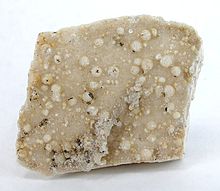| Perhamite | |
|---|---|
 Perhamite (spherical crystals aggregates) and sparkly apatite druse on feldspar. Perhamite (spherical crystals aggregates) and sparkly apatite druse on feldspar. | |
| General | |
| Category | Phosphate minerals |
| Formula (repeating unit) | Ca3Al7(SiO4)3(PO4)4(OH)3·16.5(H2O) |
| IMA symbol | Phm |
| Strunz classification | 8.DO.20 |
| Dana classification | 43.5.10.1 |
| Crystal system | Trigonal |
| Crystal class | Hexagonal scalenohedral (3m) H-M symbol: (3 2/m) |
| Space group | P3m1 |
| Unit cell | a = 7.021 Å, c = 20.218 Å; Z = 1 |
| Identification | |
| Color | Colourless, white, light brown, orange |
| Crystal habit | Spherulitic masses of platy crystals |
| Cleavage | imperfect/fair |
| Mohs scale hardness | 5 |
| Luster | Vitreous, sub vitreous, pearly |
| Streak | White |
| Specific gravity | 2.53 |
| Solubility | Insoluble |
| References | |
Perhamite is a phosphate mineral with the formula Ca3Al7(SiO4)3(PO4)4(OH)3·16.5(H2O). It occurs in rare isolated masses in amblygonite-rich pegmatite deposits throughout the world. It was discovered in platy sheed form of 1mm hexagonal crystals. It was first described in 1977 by P.J. Dunn and D.E. Appleman from pegmatite collected from Bell Pit, Newry, Maine. Other specimens have been found in Kapunda, South Australia, in Silver Coin mine near Humboldt County, Nevada and various locations throughout Europe.
Composition
The formula Ca3Al7(SiO4)3(PO4)4(OH)3·16.5(H2O) was determined by measuring its composition with x-ray spectroscopy giving the average amounts of SiO2 to be 13.72%, Al2O3 to be 27.17%, CaO to be 12.81%, P2O5 to be 21.61%, leaving 24.69% to be determined as H2O. The formula's essential elements are Al, Ca, H, O, P and Si with trace amounts of Sr. Common impurities of perhamite include Ti, Fe, Mg, Na, and F.
Physical properties
Perhamite can range in color from white to brown and can be translucent to opaque. Its luster is said to be earthy, but vitreous to pearly along fractures. It occurs as radial discoidal, platy hexagonal crystals, in rough spherules up to 1mm thick. The specific gravity of perhamite is measured at 2.64 with a calculated density of 2.53. It is structurally related to minerals in the crandallite subgroup, namely Iangreyite.
Origin of the name
Perhamite is named after Frank Croydon Perham (born 1934), an American geologist and pegmatite miner of West Paris, Maine who is currently part of the faculty of The Maine Pegmatite Workshop and has over 45 years experience in mining pegmatites. Frank Perham passed away on 31 January 2023.
See also
References
- Warr, L.N. (2021). "IMA–CNMNC approved mineral symbols". Mineralogical Magazine. 85 (3): 291–320. Bibcode:2021MinM...85..291W. doi:10.1180/mgm.2021.43. S2CID 235729616.
- ^ Handbook of Mineralogy
- Webmineral
- ^ Mindat
- Mills,S., Mumme, G., Grey, I. and Bordet, P.(2006): The crystal structure of perhamite. Mineralogical Magazine 70,201–209
- Frost, Ray L., Matt L. Weier, and Stuart J. Mills. (2007)A Vibrational Spectroscopic Study of Perhamite, an Unusual Silico-Phosphate, Spectrochimica acta. Part A, Molecular and biomolecular spectroscopy 67.3, 604–10
- ^ Dunn, P. and Appleman, D.: Perhamite, a new calcium aluminum silico-phosphate mineral and a re-examination of viseite. Mineralogical Magazine 41, 437–442
- Mills, S. (2003): A note on perhamite from the Moculata( Klemms)phosphate quarry, South Australia, Australia. J. Mineral. 9, 43–45
- Mills, S.J., Kampf, A.R., Sejkora, J., Adams, P.M., Birch, W.D., Plášil, J. (2011): Iangreyite: a new secondary phosphate mineral closely related to perhamite. Mineralogical Magazine, 75, 327–336.
- "Frank Perham".
| Phosphate minerals | |
|---|---|
| Crystalline | |
| Cryptocrystalline | |
| Amorphous | |